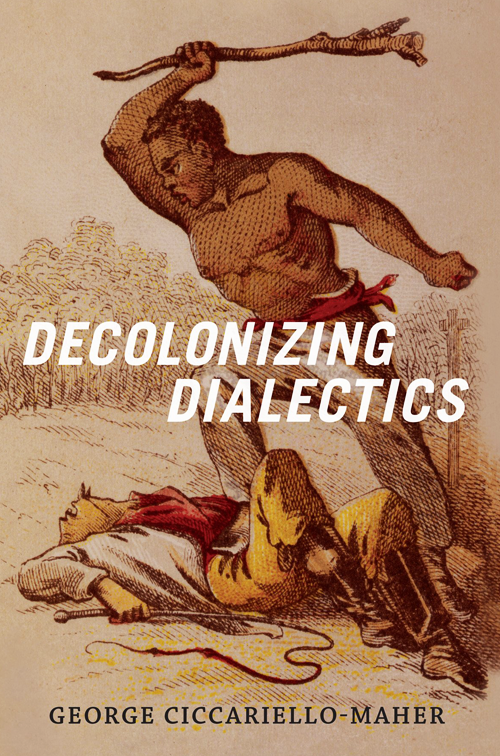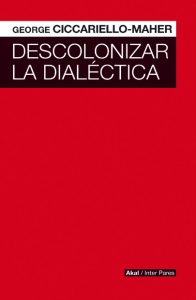DECOLONIZING DIALECTICS

Anticolonial theorists and revolutionaries have long turned to dialectical thought as a central weapon in their fight against oppressive structures and conditions. This relationship was never easy, however, as anticolonial thinkers have resisted the historical determinism, teleology, Eurocentrism, and singular emphasis that some Marxisms place on class identity at the expense of race, nation, and popular identity. In recent decades, the conflict between dialectics and postcolonial theory has only deepened. In Decolonizing Dialectics George Ciccariello-Maher breaks this impasse by bringing the work of Georges Sorel, Frantz Fanon, and Enrique Dussel together with contemporary Venezuelan politics to formulate a dialectics suited to the struggle against the legacies of colonialism and slavery. This is a decolonized dialectics premised on constant struggle in which progress must be fought for and where the struggles of the wretched of the earth themselves provide the only guarantee of historical motion.
REVIEWS
“Critiques of the dialectic are a constant in the contemporary intellectual scene, most of them unconsciously animated by dialectical logic, as George Ciccariello-Maher demonstrates. His book traces the dialectical logic of two fundamental contemporary movements, the Bolivarian Revolution in Venezuela and the internal debates within Black politics and theory. At the same time, he restores three great antidialectical thinkers—Sorel, Fanon, and Dussel—to their full dialectical stature, in analyses that range from the nature of violence to the different moments of nationalism and colonialism. It is an energetic and stimulating new intervention that enhances the theoretical canon and forces a welcome rethinking of practice itself.”
— Fredric Jameson
“If the Euro-dialectic of Hegel and Marx has limited its adventures to the poles of master and slave, or bourgeoisie and proletariat, a decolonized dialectic must take in far more territory to be true to our multipolar non-Euro world. Drawing on Sorel, Fanon, and Dussel, George Ciccariello-Maher demonstrates how this classic philosophical concept can be dynamically developed to illuminate the logics of the emancipatory struggles of the global South against white supremacy and colonial/neo-colonial rule.”
— Charles W. Mills
“Theoretically informed and mindful of the correctives real history offers to speculation, this book is a noteworthy contribution to critical social theory and decolonial discourses. Recommended. Graduate students through faculty.”
— B. G. Chang, Choice
“Decolonizing Dialectics marks an important contribution to a growing body of literature concerned with decolonizing critical – and, more broadly speaking, political – theory, as well as a worthwhile addition to the works devoted to the dialectical tradition and its critics. In particular, Ciccariello-Maher’s readings of Fanon and Dussel offer a valuable new take on their respective engagements with dialectical thought, and on the complex and fraught relationship that dialectics shares with decolonization, theoretically and practically.”
— Michael Elliott, Contemporary Political Theory
“[A] rather unique and sophisticated project that at times leaves the reader breathless from the elegant speed with which it moves through concepts…. [T]his book functions as an opening, by recentering dialectical reason and placing it in service of a radical anti-systemic practice, to successive discussions….”
— Joshua Moufawad-Paul, Marx & Philosophy Review of Books
“Decolonizing Dialectics is a worthwhile contribution to the revival of dialectical thought.”
— Joseph Leigh, E-International Relations
“Decolonizing Dialectics makes an essential contribution to our understanding of the dialectic of unity and difference and how difference becomes antagonism within and beyond the legacies of colonialism. It is essential reading in the renewal of debate about the philosophy of internal relations and the systematic dialectic.”
— Adam David Morton, Progress in Political Economy
“Decolonizing Dialectics’ timeliness lies in the fact that it gives us an approach to these tensions as academics, which exploits their decolonial potential, and affirms, after and through Fanon, their necessary violence, rather than just settle for reciprocity, closure, or another book on dialectics.”
— Shona N. Jackson, Antipode
“This clear, well-written and refreshingly forthright book aims to decolonize dialectics and to wield that decolonized dialectics (never, Ciccariello-Maher insists, ‘the dialectic’) as a method to understand and further decolonization. . . . This is an important work best read in the spirit in which it is written: with urgency, anger, hope and a refusal to simply accept what is present.”
— David M Bell, Political Studies Review
“The author makes important contributions to the fields of dialectics, Marxism, postmodernism, and postcolonial studies, and he has an aptitude for making tough philosophical questions accessible. Decolonizing Dialectics provides an excellent framework for understanding the major theorists he uses as well as Hegel, Marx, Foucault, and several other scholars.”
— Luis M. Sierra, Journal of Global South Studies
“A light-footed and richly textured work, which demonstrates how radically different historical moments can speak to one another; how dialectics animated by a certain mobility and openness might help to explain, and ultimately transcend, the legacies of colonialism and slavery.”
— Alex Millen, Journal of American Studies
“Maher’s book is an important effort to redefine the dialectic in a more radical and indeed, violent manner.”
— William L. Remley, Anarchist Studies
“The richness of George Ciccariello-Maher’s work lies in generating, for its readers . . . questions that are pivotal to the work of imagining alternative futures.”
— Kris Sealey, Hypatia Reviews Online
